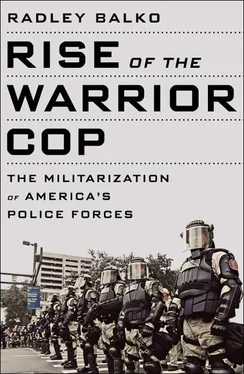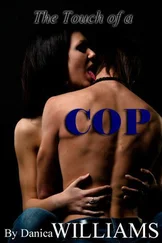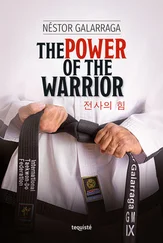McKittrick then unleashed an even more audacious argument. He claimed that allowing Clifton’s criminal trial to go forward would be a slap in the face to the civil rights movement . By McKittrick’s reckoning, a federal investigation had already determined that Clifton had committed no crime. To allow a local prosecutor to bring criminal charges against him now would open the door to racist prosecutors in the South bringing trumped-up charges against federal prosecutors and civil rights investigators. The same administration that had capitalized on white fears about black crime, that had squeezed political capital from white resentment of civil rights protesters, was now arguing that a white federal drug agent should be let off the hook for killing a man… to protect the civil rights movement.
McKittrick was eventually able to get the case moved to federal court. A federal district court judge dismissed the charge, finding that Clifton’s actions were reasonable under the circumstances of the raid. Nearly five years after Dirk Dickenson’s death, the Ninth Circuit US Court of Appeals upheld the ruling. 62
In the end, a twenty-four-year-old man was chased from his own home by armed men who had just emerged from an Army helicopter. They then shot him dead, from the back, while he was unarmed, and on his own property. The heavy-handed raid was based on false pretenses and didn’t turn up the criminal enterprise it was supposed to find. No one would be held accountable for any of it. Dirk Dickenson was collateral damage.
In eleven years, the helicopters would return to Humboldt County.
HERBERT GIGLOTTO MADE GOOD MONEY AS A BOILERMAKER. That made the job’s early mornings more tolerable. He and his wife Evelyn went to bed each night at 8:00 PM to be sure he was up by 5:00 AM to get to his job. The couple lived in Collinsville, Illinois, a small suburban town of about twenty thousand people, fifteen minutes outside of St. Louis.
At a little after 9:30 PM on April 23, 1972, the Giglottos woke to a crash. And then another. The couple’s inner and outer doors were being ripped from their hinges. Someone was breaking into their home.
“I got out of bed; I took about three steps, looked down the hall and [saw] armed men running up the hall dressed like hippies with pistols, yelling and screeching.” Giglotto turned to his wife, who was still in bed, and said, “God, honey, we’re dead.”
“That’s right, you motherfucker!” one of the men screamed. The men—fifteen of them—then stormed the bedroom. One of them threw Giglotto to the bed, bound his hands behind his back, and put a gun to his head.
“Move and you’re dead,” the man said. He then motioned in the direction of Evelyn Giglotto. “Who is that bitch lying there?”
“That’s my wife.”
Evelyn Giglotto cried out, “Please don’t kill him!”
“Shut up!” the man snapped.
The man with the gun at Herbert’s head quickly flashed a badge, though he didn’t give Herbert time to read it. These were cops . The man then read a list of names and asked Herbert if he knew any of them. He knew none of them.
“You’re going to die if you don’t tell us where the drugs are.”
Giglotto pled with the man, “Please, please, before you shoot us, check my wallet for my identification. Because I know you’re at the wrong place.”
Seconds later, someone shouted from the stairs. “We’ve made a mistake!”
The men unbound the Giglottos and began to filter out.
Herbert struggled to put on his pants to chase after them for more information. He shouted, “Why did you do that?”
The man who’d just held a gun to his head answered, “Boy, you shut your mouth.”
Evelyn Giglotto was most upset that the police had also thrown the couple’s animals—three dogs and a cat—outside. (Given the frequency of dog-shooting during raids in the coming years, the Giglottos’ pets got off easy.) “When you don’t have children, your pets sort of become your children,” she later explained in a newspaper interview. When she asked the police if her pets had been harmed, one of them replied, “Fuck your animals.”
And with that they left.
A half-hour later, this time on the north side of Collinsville, Arnold Blass, who had just finished cleaning his pistol and putting it away in the house, was chatting with a friend as the two cleaned the carp they’d just caught. A suspicious car had been circling the neighborhood. The two grew concerned when it pulled into a lot across the street and a group of shabbily dressed men emerged with guns, racing toward the home of Blass’s neighbors, Don and Virginia Askew. Blass and his friend walked over to meet the men, only to be brusquely pushed aside as one of them quickly flashed a badge that Blass didn’t believe was real. He later told the New York Times, “It’s a good thing I didn’t have my gun.”
Inside the Askew home, Charlie, the family dog, began barking at a disturbance outside. Virginia Askew went to the living room to investigate.
“My God, Don,” she said to her husband. “There’s a man at the window.” Every window in fact. The two looked around and saw guns pointed at them from every angle. Outside the front door, three more men stood with shotguns. Virginia Askew reached for the phone to call the police, but one of the men motioned to her from the other side of the window that doing so wouldn’t be in her best interest.
Seconds later, one of the men delivered a powerful kick to the door, sending it quickly off its hinges and into the wall. Virginia ran to the bedroom with a shriek, passed out, and smacked her head on a table as she fell. Thinking they were being robbed, the couple’s sixteen-year-old son tried to call the police. One of the men put a shotgun in his face. More men poured in from the opposite direction after kicking in a back door. Finally, one of them flashed a badge.
“If I kept a gun by the door, I’d have used it,” Don Askew told the Times, then added that he’d also likely be dead for doing so.
As the cops ransacked the Askew house, Virginia regained consciousness, then began to hyperventilate. One of the men asked Don, “Do you know John Coleman?” Virginia, still bound, told them she couldn’t breathe.
“Take it easy, lady,” one of them told her. “We’re federal agents, and we’ve gotten a bum tip.”
They started to leave. Don Askew’s mood shifted from scared to angry. And he still was not entirely sure the men were who they claimed to be. He followed them outside and asked them to wait until the police arrived.
“We can’t,” one of them replied. “We’ve got four more places to go tonight.” 63
The team in Collinsville was one of the thirty-eight strike forces created across the country by Myles Ambrose’s ODALE office. It was the new public face of Nixon’s drug war: swift, ruthless, overpowering, little tolerance for deviants. Finally Nixon had a team of cops who could utilize the tools he’d fought hard to give them. There would be no more feuding with federal bureaucrats. Namby-pamby local police chiefs and budgetary concerns could no longer get in the way. With LEAA funding, Ambrose was able to target specific state and local police departments that would carry out the drug war the way he wanted. In the five years leading up to the creation of ODALE, the primary federal drug enforcement agency, the Bureau of Narcotics and Dangerous Drugs, had carried out four no-knock search warrants. In its first six months, ODALE carried out over one hundred.
Ambrose even set up a national “heroin hotline” that citizens could call to give tips on heroin dealers. The call center was run out of a Virginia mine shaft that at one time had been a possible destination for high-ranking government officials in the event of a nuclear attack on America. Ambrose was able to get half the staff of the federal Office of Emergency Preparedness transferred to ODALE—to answer phones on the heroin hotline. Promising tips—which could be phoned in anonymously—were forwarded to the closest regional strike force, which in theory would then pounce on the suspected drug dealer. 64
Читать дальше













